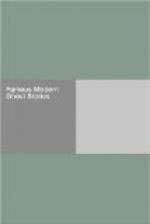The sun had already disappeared, a monstrous black shadow came running from the east—it was as if gigantic bare feet began rumbling on the sand, and the wind sent a cold wave along the backbone.
“In the darkness thou seemest still larger, Lazarus, as if thou hast grown stouter in these moments. Dost thou feed on darkness, Lazarus? I would fain have a little fire—at least a little fire, a little fire. I feel somewhat chilly, your nights are so barbarously cold.... Were it not so dark, I should say that thou wert looking at me, Lazarus. Yes, it seems to me, thou art looking.... Why, thou art looking at me, I feel it,—but there thou art smiling.”
Night came, and filled the air with heavy blackness.
“How well it will be, when the sun will rise to-morrow anew.... I am a great sculptor, thou knowest; that is how my friends call me. I create. Yes, that is the word ... but I need daylight. I give life to the cold marble, I melt sonorous bronze in fire, in bright hot fire.... Why didst thou touch me with thy hand?”
“Come”—said Lazarus—“Thou art my guest.”
And they went to the house. And a long night enveloped the earth.
The slave, seeing that his master did not come, went to seek him, when the sun was already high in the sky. And he beheld his master side by side with Lazarus: in profound silence were they sitting right under the dazzling and scorching sunrays and looking upward. The slave began to weep and cried out:
“My master, what has befallen thee, master?”
The very same day the sculptor left for Rome. On the way Aurelius was pensive and taciturn, staring attentively at everything—the men, the ship, the sea, as though trying to retain something. On the high sea a storm burst upon them, and all through it Aurelius stayed on the deck and eagerly scanned the seas looming near and sinking with a thud.
At home his friends were frightened at the change which had taken place in Aurelius, but he calmed them, saying meaningly:
“I have found it.”
And without changing the dusty clothes he wore on his journey, he fell to work, and the marble obediently resounded under his sonorous hammer. Long and eagerly worked he, admitting no one, until one morning he announced that the work was ready and ordered his friends to be summoned, severe critics and connoisseurs of art. And to meet them he put on bright and gorgeous garments, that glittered with yellow gold—and—scarlet byssus.
“Here is my work,” said he thoughtfully.
His friends glanced and a shadow of profound sorrow covered their faces. It was something monstrous, deprived of all the lines and shapes familiar to the eye, but not without a hint at some new, strange image.
On a thin, crooked twig, or rather on an ugly likeness of a twig rested askew a blind, ugly, shapeless, outspread mass of something utterly and inconceivably distorted, a mad leap of wild and bizarre fragments, all feebly and vainly striving to part from one another. And, as if by chance, beneath one of the wildly-rent salients a butterfly was chiseled with divine skill, all airy loveliness, delicacy, and beauty, with transparent wings, which seemed to tremble with an impotent desire to take flight.




